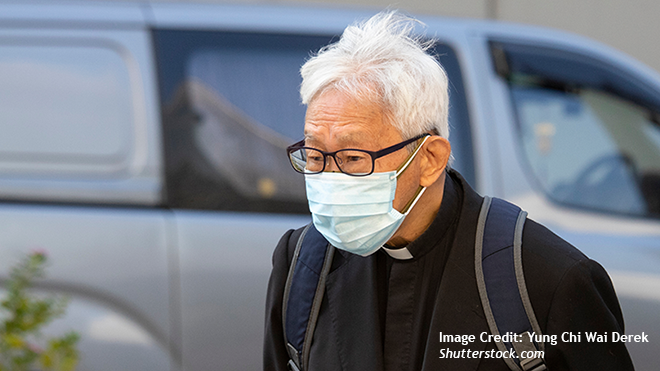Controversial Cardinal Arrested in Hong Kong

Joseph Zen is a well known and beloved cardinal of the Catholic Church in Hong Kong. He has served as the sixth Bishop of the city. In 2006 Zen was appointed Cardinal by the Pope and has been outspoken on issues regarding human rights, political freedom and religious liberty. His strong ties with the pro-democracy camp have often attracted criticism from the pro-Beijing camp and the government of the People´s Republic of China. Since he retired on April 15, 2009, he remains a strong pro-democracy influence in Hong Kong. On May 11, 2022, he was arrested by the National Security Police and later that day released on bail.
Early life and career
Joseph Zen was born in 1932 in Shanghai to Catholic parents. He studied at a church school during the Second Sino-Japanese war, but was sent to a monastery when his father suffered a stroke. Like many others Zen fled to Hong Kong from Shanghai to escape Communist rule at the end of the Chinese civil war. He was ordained after theological studies at the Salesian Pontifical University in Rome.
Back in Hong Kong he taught from 1973 in the Holy Spirit Seminary College. In 1978, he became the Provincial Superior of Salesians, which includes mainland China, Hong Kong, Macau and Taiwan.
During the years 1989–1996, Zen lectured in the theological seminaries of his church in mainland China, centers of studies acknowledged by the Communist party, until he was appointed Coadjutor Bishop of Hong Kong in 1996 by Pope John Paul II.
In February 2006, the Vatican announced that Bishop Zen would be elevated to the College of Cardinals by Pope Benedict XVI. This was certainly considered by Zen as a sign of how much the Pope valued the Church in China. The Catholics in Hong Kong saw this as recognition of the Bishop’s clear stance on social justice and a great honor for the church in Hong Kong.
As a Cardinal he has been very outspoken on issues regarding human rights, political freedom and religious liberty. His strong ties with the pro-democracy camp often attracted increased criticism from the pro-Beijing camp in the city and the People´s Republic of China.
Sudden retirement?
In 2007, he expressed a wish to retire from being the respected and beloved Catholic bishop of the city. He also said that he wanted to be a teacher in either mainland China or in Africa as there was a shortage of teachers in Africa. But members of the more progressive democratic political elite in Hong Kong asked him to reconsider his decision, praising him for being braver than the other religious leaders in Hong Kong in sharing his political views. They also said that they wanted him to stay because “cardinal Zen carried out his ideas of fairness, equitableness and philanthropy via actual efforts”. On the other hand, some conservative Catholic members thought that the strained relationship between Beijing and the Holy See would become more relaxed if Zen retired.
Nevertheless, Zen wrote a letter to the Pope and insisted that he wished to be allowed to retire from his position, though not because of his age. In 2009, Pope Benedict accepted his resignation.
The Cardinal has been a stern supporter of the Hong Kong´s pro-democracy movement. He was usually one of the first leading the masses of hundreds of thousands of protesters in the marches for increased democracy in the city. In 2003, he openly opposed the government´s plan to enact national security laws under article 23 of Hong Kong´s Basic Law, which critics warned would damage speech and political freedom. Zen also took part in the 2014 Occupy Central protests, which called for universal suffrage. Addressing the protesters, Zen said: ”It is high time we really want to be free and not slaves. We must unite together”. During his speech some protesters were fired on by the police.
A staff member of the Catholic diocese of Hong Kong was worried that if Zen was arrested, it would be the end of his regular prison visits. Being also a prison chaplain, he had access to people in custody and was not limited by a visit quota. This meant that he sometimes visited as many as three prisons a day.
Cardinal Zen was openly critical of the Catholic Church in China being under government control while the Catholic Church in Hong Kong had largely remained independent. When Pope Francis wanted to improve the relationship of the Vatican with the Catholic Church in China, Cardinal Zen asked the Pope not to visit the country. “Do not come, you would be manipulated”, was his message. Zen was sure that the few really courageous Catholics there would not be able to meet with the Pope. The Communist Party would just show him some, in his view illegitimate, bishops.
When Cardinal Zen was arrested by the Hong Kong police in May, it was with four others who had helped him to run the disbanded 612 Humanitarian Relief Fund for protesters, all on the charge of collusion with foreign forces.
Views within the church are split over Zen: Some think he is too radical, while others support his outspokenness. Those who speak out in support for Zen are worried that any public action, however mild, would create only more trouble for him. Zen´s supporters are keeping him in their prayers and discuss his arrest only in private. Although local authorities denied the arrest had anything to do with religious freedom, some were worried that a crackdown on churches would spread from mainland China to Hong Kong.
“To be religious is more than worshipping, we also need to do justice,” a Catholic spokesperson said. “In the past, we extended a helping hand to others and we did not imagine being in the same position. Now who is going to help us?” This was also said with reference to the many efforts by the Hong Kong church community to support independent churches in mainland China.